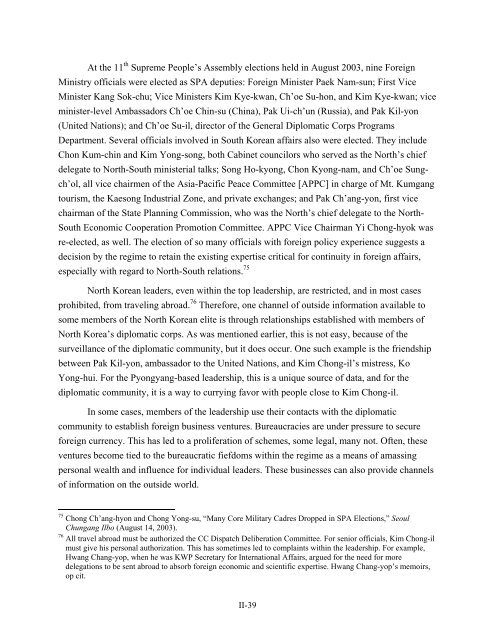North Korean Policy Elites - Defense Technical Information Center
North Korean Policy Elites - Defense Technical Information Center
North Korean Policy Elites - Defense Technical Information Center
You also want an ePaper? Increase the reach of your titles
YUMPU automatically turns print PDFs into web optimized ePapers that Google loves.
At the 11 th Supreme People’s Assembly elections held in August 2003, nine Foreign<br />
Ministry officials were elected as SPA deputies: Foreign Minister Paek Nam-sun; First Vice<br />
Minister Kang Sok-chu; Vice Ministers Kim Kye-kwan, Ch’oe Su-hon, and Kim Kye-kwan; vice<br />
minister-level Ambassadors Ch’oe Chin-su (China), Pak Ui-ch’un (Russia), and Pak Kil-yon<br />
(United Nations); and Ch’oe Su-il, director of the General Diplomatic Corps Programs<br />
Department. Several officials involved in South <strong>Korean</strong> affairs also were elected. They include<br />
Chon Kum-chin and Kim Yong-song, both Cabinet councilors who served as the <strong>North</strong>’s chief<br />
delegate to <strong>North</strong>-South ministerial talks; Song Ho-kyong, Chon Kyong-nam, and Ch’oe Sungch’ol,<br />
all vice chairmen of the Asia-Pacific Peace Committee [APPC] in charge of Mt. Kumgang<br />
tourism, the Kaesong Industrial Zone, and private exchanges; and Pak Ch’ang-yon, first vice<br />
chairman of the State Planning Commission, who was the <strong>North</strong>’s chief delegate to the <strong>North</strong>-<br />
South Economic Cooperation Promotion Committee. APPC Vice Chairman Yi Chong-hyok was<br />
re-elected, as well. The election of so many officials with foreign policy experience suggests a<br />
decision by the regime to retain the existing expertise critical for continuity in foreign affairs,<br />
especially with regard to <strong>North</strong>-South relations. 75<br />
<strong>North</strong> <strong>Korean</strong> leaders, even within the top leadership, are restricted, and in most cases<br />
prohibited, from traveling abroad. 76 Therefore, one channel of outside information available to<br />
some members of the <strong>North</strong> <strong>Korean</strong> elite is through relationships established with members of<br />
<strong>North</strong> Korea’s diplomatic corps. As was mentioned earlier, this is not easy, because of the<br />
surveillance of the diplomatic community, but it does occur. One such example is the friendship<br />
between Pak Kil-yon, ambassador to the United Nations, and Kim Chong-il’s mistress, Ko<br />
Yong-hui. For the Pyongyang-based leadership, this is a unique source of data, and for the<br />
diplomatic community, it is a way to currying favor with people close to Kim Chong-il.<br />
In some cases, members of the leadership use their contacts with the diplomatic<br />
community to establish foreign business ventures. Bureaucracies are under pressure to secure<br />
foreign currency. This has led to a proliferation of schemes, some legal, many not. Often, these<br />
ventures become tied to the bureaucratic fiefdoms within the regime as a means of amassing<br />
personal wealth and influence for individual leaders. These businesses can also provide channels<br />
of information on the outside world.<br />
75 Chong Ch’ang-hyon and Chong Yong-su, “Many Core Military Cadres Dropped in SPA Elections,” Seoul<br />
Chungang Ilbo (August 14, 2003).<br />
76 All travel abroad must be authorized the CC Dispatch Deliberation Committee. For senior officials, Kim Chong-il<br />
must give his personal authorization. This has sometimes led to complaints within the leadership. For example,<br />
Hwang Chang-yop, when he was KWP Secretary for International Affairs, argued for the need for more<br />
delegations to be sent abroad to absorb foreign economic and scientific expertise. Hwang Chang-yop’s memoirs,<br />
op cit.<br />
II-39













